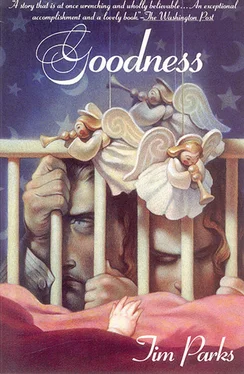Tim Parks - Goodness
Здесь есть возможность читать онлайн «Tim Parks - Goodness» весь текст электронной книги совершенно бесплатно (целиком полную версию без сокращений). В некоторых случаях можно слушать аудио, скачать через торрент в формате fb2 и присутствует краткое содержание. Год выпуска: 1994, Издательство: Grove Press, Жанр: Современная проза, на английском языке. Описание произведения, (предисловие) а так же отзывы посетителей доступны на портале библиотеки ЛибКат.
- Название:Goodness
- Автор:
- Издательство:Grove Press
- Жанр:
- Год:1994
- ISBN:нет данных
- Рейтинг книги:3 / 5. Голосов: 1
-
Избранное:Добавить в избранное
- Отзывы:
-
Ваша оценка:
- 60
- 1
- 2
- 3
- 4
- 5
Goodness: краткое содержание, описание и аннотация
Предлагаем к чтению аннотацию, описание, краткое содержание или предисловие (зависит от того, что написал сам автор книги «Goodness»). Если вы не нашли необходимую информацию о книге — напишите в комментариях, мы постараемся отыскать её.
, to get his life back on the rails again.
Goodness — читать онлайн бесплатно полную книгу (весь текст) целиком
Ниже представлен текст книги, разбитый по страницам. Система сохранения места последней прочитанной страницы, позволяет с удобством читать онлайн бесплатно книгу «Goodness», без необходимости каждый раз заново искать на чём Вы остановились. Поставьте закладку, и сможете в любой момент перейти на страницу, на которой закончили чтение.
Интервал:
Закладка:
Shirley is moaning now. I can think of no other word for it, a low animal cry, her face in her hands.
Overtaking on the inside lane, squeezing back into the flow before a parked car, it occurs to me that driving is not unlike a computer game. Some program that would project your score onto a corner of the windscreen perhaps?
I say maybe it really is only post-operative trauma. How can we know? In any event we must find some other consultant to contact who will tell us more. ‘These guys never tell us anything.’ Maybe we can find out if there’s some big specialist in America or Switzerland or something. ‘You can bet they’ll be light years ahead of the NHS for this kind of thing.’
‘I wish we’d never met,’ she says.
‘Come on, Shirley.’
‘Sometimes I hate you for all this.’
I don’t object. I often feel the same.
We drive on with an urgency that scatters other traffic like confetti. She doesn’t comment on it as she usually does. One secretly hopes for an apocalyptic accident of course. She leans over her seat and caresses the child’s thin hair. She is murmuring now. I stare at the road.
Has my mother been working on Shirley these weeks she’s been staying with us? I haven’t actually noticed anything, but I often think Mother manages to exude influence even without speaking. Her eyes, her posture, her tone. She will persuade you to see the world as she sees it. In any event, when we get back home, Shirley carries the baby with her into the house while I stick the car in the garage, taking my time over everything now, relaxing, calming down, turning keys and handles with the slow, almost voluptuous pleasure I have recently begun to find in doing all those little activities that keep you just outside the family sphere: taking a pee, a bath, a shave, carrying the rubbish out to the bin, changing a lightbulb in an empty bedroom. I move with meticulous painstaking slowness, the exact opposite of my driving, though the escapist intent is no doubt the same. When finally I walk into the living room, Shirley is in my mother’s arms weeping.
She is making some kind of confession. It is all her fault she is saying in a low voice broken by sobs. All her fault. She’s been a terrible wife, she forced me to go and have other women, had an affair herself for ages and ages.
‘Shirley!’
Instinctively I try to wade in and stop this, but she clings tightly to my mother whose large face watches me over her shoulders.
‘It must be a punishment. It must. It’s too awful.’
‘Shirley, shut up!’
I start to shout, to try to pull them apart. Hilary wakes, as she always does, screaming. Through the bedlam, my mother says quietly: ‘George, why don’t you just go out for a while and let her get this off her chest.’
I hate, no really hate the attempt, inherent in that everyday expression (’get this off her chest’) and again in her tone of voice, her willed serenity and motherliness, to reduce the whole thing to a kind of understandable outburst which will soon be over.
‘No. It’s ridiculous. Shirley. Don’t be crazy! Let’s talk this over on our own.’
My mother, her face half in Shirley’s mussed hair, mouthes the word: ‘Please.’ Her old eyes, tremulous in their papery net of wrinkles, glow and plead, insisting I am her son. And I go. As much simply to be out of it as anything else. I go to Child’s Hill Park and smoke about a hundred cigarettes.
When I get back, they are in the baby’s room, kneeling and praying by Hilary’s cot. They don’t see me at first and I spy on them a moment from the landing. They are knelt in a clutter of toys and baby clothes on the carpet. The curtains must be drawn, because the light is pinkish grey filtered through red. My mother, on her swollen knee, has both raw hands hooked over the top rail of the cot, her face pressed against her knuckles, shoulders hunched, back bowed. Shirley on the other hand is kneeling straight up in perfect finishing school posture, girlish, virginal, the smart dove-grey wool dress she put on for the consultant falling prettily over her curved back, her slim calves; the fine ankles still in their white summer sandals. Then Mother launches into another prayer: Oh dear Lord who so often in the past. .’
In bed I ask: ‘You really had an affair?’
‘Yes.’
‘Who with?’
‘A teacher at school.’
‘When you were so depressed?’
She laughs softly: ‘No, before that. I was depressed when I lost him.’ She adds: ‘I’m sorry, George.’
I take this in. After a moment I tell her: ‘I don’t blame you for that. But this with my mother is the worst betrayal of all.’
And next morning when I get Mother alone for a second I ask her please to go. I don’t care how much help she is being, she’ll have to go.
It is a Saturday and I spend the whole day cracking a computer game called Helicopter Attack. The sneaky thing is the way they keep altering the wind speed so that you drift off course into the flak. In the evening Peggy comes over with Charles and mentions almost in passing that Buddhist Barry, her lover of two years standing, has left her. The marvellous thing, it occurs to me, about Peggy is how she never needs comforting.
Flow Chart
Drama over, routine sets in; looking after this strange child who catches every possible infection, who is allergic to antibiotics, to food additives, who knows no difference between night and day; the progress of other children (Peggy’s Frederick, Greg and Jill’s Rachel, running, jumping, chattering, doing jigsaw puzzles) simply underlining this other baby’s utter lack of it, can’t roll over, can’t hold anything, can’t sit up; Shirley giving all her time, all her energy, the exhausting nights. At age one, eight months after the op, the little girl smiles again, she even chuckles.
‘You see, she’s happy.’
‘Shirley, she’s blind, she’s immobile, she’s utterly deprived.’
‘But she doesn’t know she is. In her spirit she’s happy.’
I say: ‘I smile a lot. At the office I even guffaw. I tell jokes. It doesn’t mean I’m happy.’
‘That’s your problem,’ she says. ‘Or do you want me to kill you out of sympathy?’
She begins to find the most minimal signs of progress, an ability to clasp a hand around your finger, to move her head, just ever so slightly, when she’s called. Sometimes. She doesn’t attach disproportionate hopes to these developments. On the contrary, it’s really a sign that she has accepted things. She is content with this much. The girl can clasp your finger. So there is something there. Some personality.
At nearly two the child learns to roll over. We can’t leave her on the couch any more.
Stimulation! Yet another consultant expensively tells us what we’ve already read in books. And now I am encouraged to design ‘computer games’ for the child. Well, I’m willing to try. I start with a big board that straps onto the eating tray on her £500 chair. When she presses coloured knobs an amplifier plays different tunes and bright colours shine on our TV screen placed right in front of her. Perhaps she can see, just a little. Perhaps. I wire up a system of pedals for her feet, I make the controls of the hand-operated board more complicated so she has to manipulate them, to the right, to the left. This strange child giggles, hearing our voices around her. She gets excited, heaving herself about. And it is gratifying. Shirley is impressed, grateful. I become enthusiastic. Hilary is pressing the pedals. She is, somehow, with wrist and elbow as much as fingers, moving the knobs. On purpose or at random? Her face is blank apart from those sudden brilliant smiles. Which don’t always seem to coincide with any visible stimulus, but does that matter? When I introduce a knob she has to turn rather than push she can’t do it. Immediately she loses interest. If it really was interest. She bellows. Flails limbs. What does she want? Give her food? Her bottle? No, she spits it out and screams. Hug her? She bellows even louder. What then? I think, this child will be in nappies, at five, at fifteen. At thirty. While Shirley tells our friends: see the progress she is making, she can push these knobs, look, these pedals, she makes the tune play, the lights come on. I can see the pain in the visitor’s eyes, the desire to change the subject, to head for the drinks cabinet. Even Peggy doesn’t seem to want to hold the girl. She’s heavy. With no real exercise she’s getting fat. How loud will she bellow when she’s twenty?
Читать дальшеИнтервал:
Закладка:
Похожие книги на «Goodness»
Представляем Вашему вниманию похожие книги на «Goodness» списком для выбора. Мы отобрали схожую по названию и смыслу литературу в надежде предоставить читателям больше вариантов отыскать новые, интересные, ещё непрочитанные произведения.
Обсуждение, отзывы о книге «Goodness» и просто собственные мнения читателей. Оставьте ваши комментарии, напишите, что Вы думаете о произведении, его смысле или главных героях. Укажите что конкретно понравилось, а что нет, и почему Вы так считаете.












